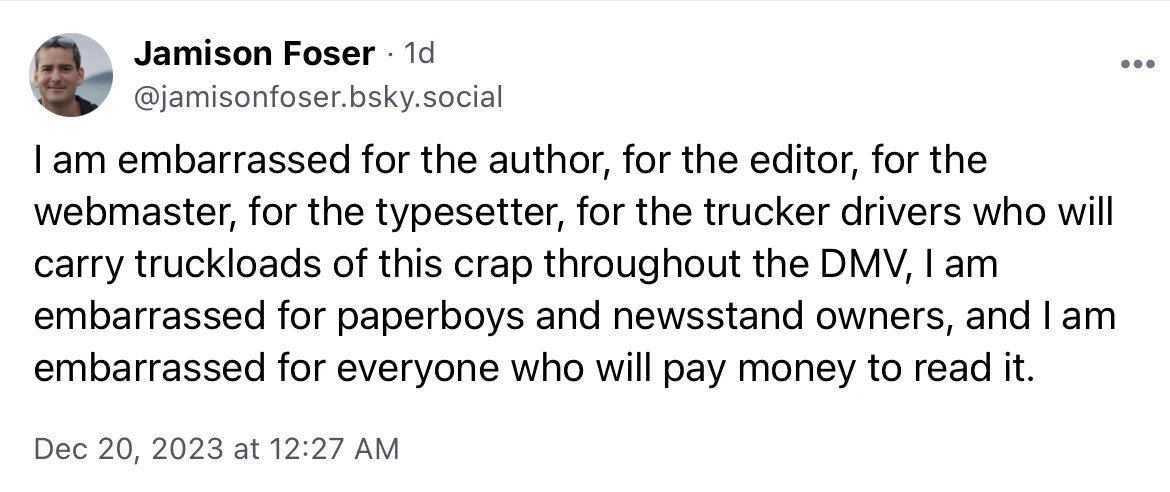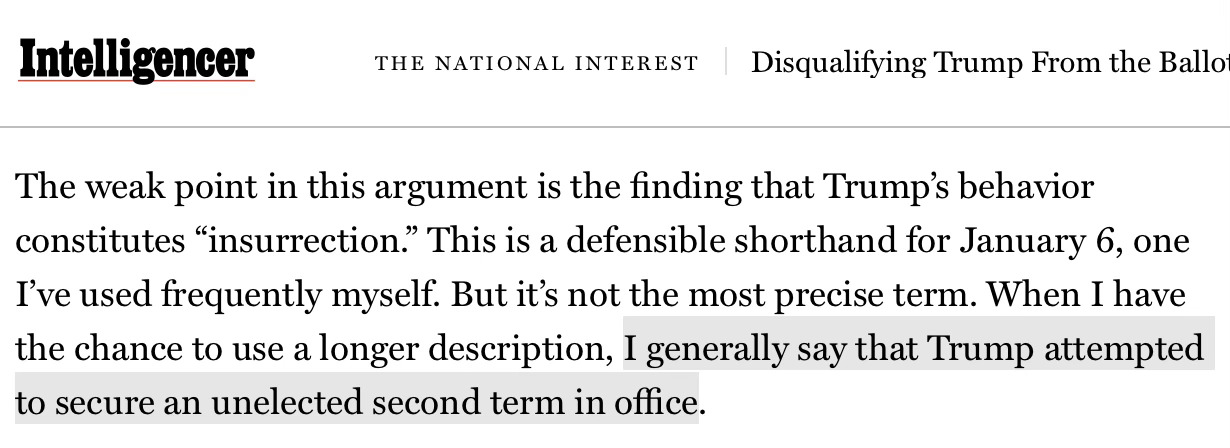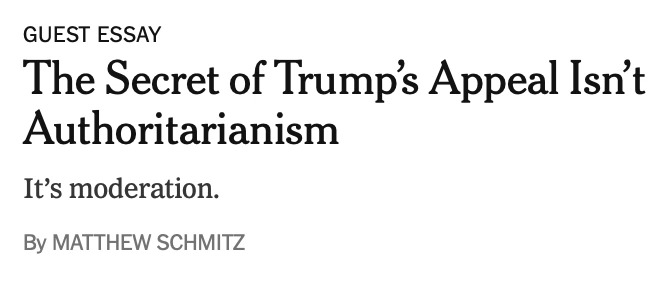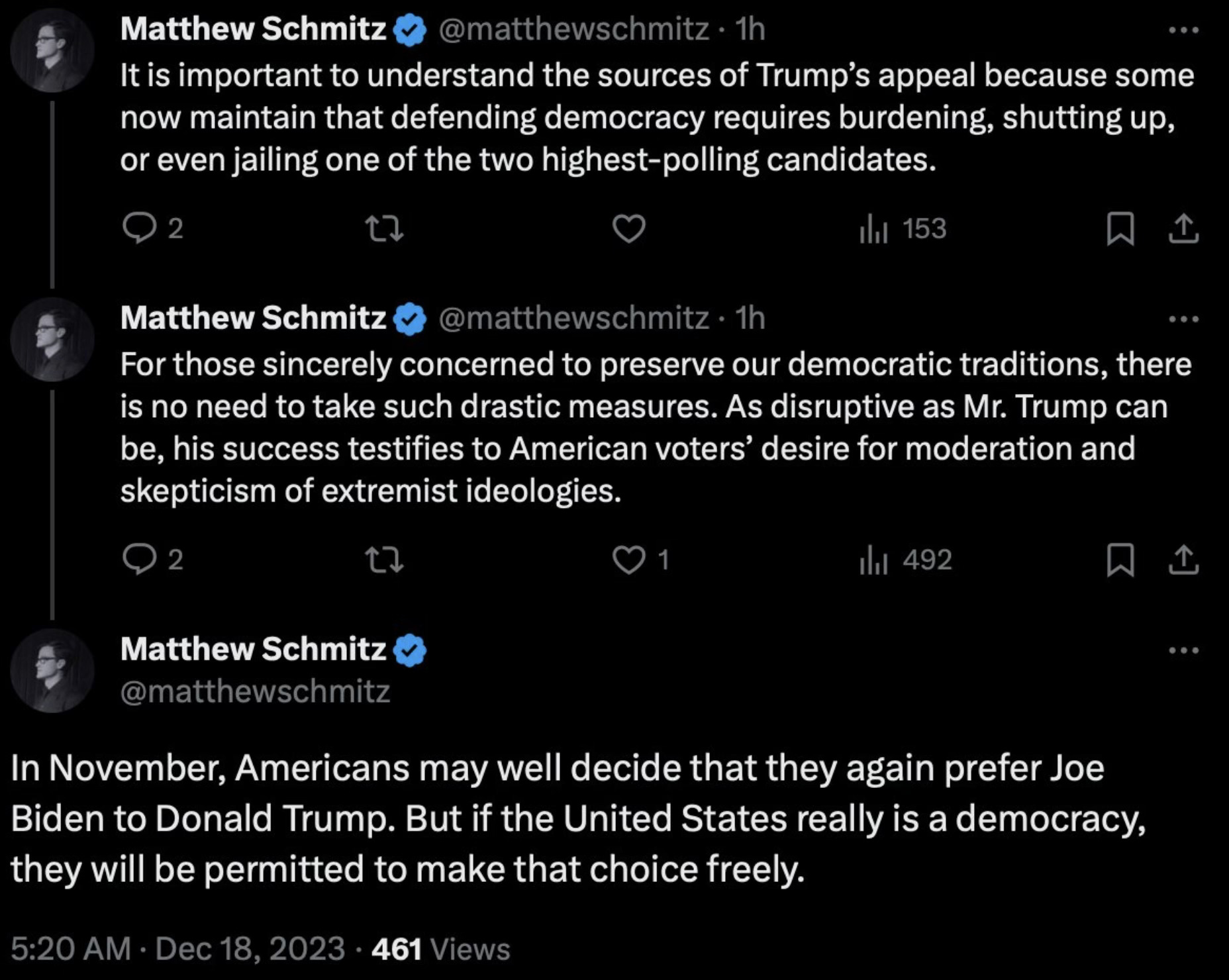The three worst things I've read all year

There’s been an impressive amount of absolutely terrible punditry lately and I can’t decide which thing to focus on so let’s just do a quick speed round, okay?
Here’s Washington Post associate editor Ruth Marcus responding to new revelations that Clarence Thomas’s right-wing billionaire benefactors started subsidizing his lavish lifestyle more than 20 years ago — immediately after Thomas, hundreds of thousands of dollars in debt, complained his salary ($173,600 at the time; $285,400 now) wasn’t high enough, sparking fears at the highest levels of the conservative movement that Thomas might resign his seat on the Supreme Court in favor of a more lucrative career, which would have created an open seat for Bill Clinton to fill:

“Blundered”? That’s what we’re calling two decades of bribe solicitation resulting in hundreds of thousands — if not millions — of dollars in gifts ranging from luxury vacations to free rent and private school tuition for family members, most of which Thomas failed to disclose as required?
Marcus concludes: “Thomas ought to have behaved better. But he, and his brethren, ought to be paid better, too.”
“Ought to have behaved better”? That’s how you describe a kindergartener who giggles with classmates during nap time, not a Supreme Court justice on the take.
The quality of Marcus’s argument in favor of a pay increase for Thomas isn’t any better than the tone of her descriptions of his wrongdoing. Her entire case comes down to this: Clarence Thomas and his fellow Supreme Court justices should be paid more because other people make more money than they do. Seriously, that’s her whole case. She specifically concedes that there is absolutely no reason to believe that Supreme Court justice’s salaries don’t limit the pool of people willing to serve on the high court:
Federal judgeships are at the apex of the pyramid of prestige for lawyers. Some potential nominees might decide the relatively modest federal salary that comes with the post isn’t tolerable; some serving judges might choose to return to the private sector after some time on the bench. But there isn’t conclusive evidence of such a troubling trend.
Whatever the salary, there will always be more highly qualified applicants than slots available, certainly at the Supreme Court. No one is turning down a Supreme Court nomination because the job doesn’t pay enough — and, Thomas’s reported bellyaching notwithstanding, no one seems to be quitting for that reason, either.
And she specifically concedes that justices earn almost five times the median full-time salary in America:
And to be clear, these aren’t pauper’s wages. The chief justice is earning $298,500 this year, associate justices $285,400. Federal appeals court judges make $246,600, and trial court judges $232,600. The median wage for a full-time worker in the United States is about $60,000.
But other people make even more than that, so … give the justices a raise:
Still, that’s not the proper benchmark. Consider that young lawyers fresh off a Supreme Court clerkship can join big law firms and pocket signing bonuses approaching $500,000 — that on top of salaries around $300,000. That doesn’t include year-end bonuses.
That’s it. That’s Marcus’s entire case for a SCOTUS pay raise: other people make more money. And that’s her entirely bizarre reaction to revelations that Clarence Thomas not-so-subtly solicited the decades of private jet vacations, forgiven luxury RV loans, and free tires1 from a network of right-wing billionaires desperate to keep him on the court: Give that naughty man a raise!
In summary:

OK, moving on … here’s New York magazine’s Jonathan Chait, opposing the Colorado Supreme Court’s obviously correct decision that the 14th Amendment’s prohibition on people who have previously violated an oath to uphold the constitution by participating in insurrection against America going on to serve in high government office obviously applies to Donald Trump:
The argument for disqualification is quite simple. The Constitution bars officeholders who engaged in insurrection; on January 6, 2021, Trump engaged in insurrection; therefore, Trump is ineligible to hold office.
The weak point in this argument is the finding that Trump’s behavior constitutes “insurrection.” This is a defensible shorthand for January 6, one I’ve used frequently myself. But it’s not the most precise term. When I have the chance to use a longer description, I generally say that Trump attempted to secure an unelected second term in office.
Yeah, he really wrote that. I know, it’s hard to believe. Here’s a screenshot in case you need proof:

Chait’s argument that “Disqualifying Trump from the ballot is a step too far” comes down to arguing that, although Chait himself “frequently” describes Trump as having engaged in an insurrection, Chait prefers to say that Trump merely — I’m sorry, it’s hard to type this while laughing, give me a moment — “attempted to secure an unelected second term in office.”
Your honor, I didn’t steal that television, I merely attempted to liberate it from Best Buy without tendering payment.
Chait, continuing directly, spells out the totally-not-insurrectionist-even-though-Chait-frequently-calls-it-that way Trump “attempted to secure an unelected second term in office”:
Trump’s plan was to mobilize a mob to intimidate Congress into following his scheme to ignore the election results. His use of violent threats to secure power is obviously unforgivable, authoritarian, and very likely criminal. But there is at least some grounds to question whether it was an “insurrection” in the meaning intended by the 14th Amendment. Trump was not trying to seize and hold the Capitol nor declare a breakaway republic.
What.
Trump — according to Jonathan Chait — mobilized a mob to intimidate Congress, via threats of violence, into allowing him to remain president despite losing the election. And this, according to Jonathan Chait, is not an “insurrection” but merely an attempt to “secure an elected second term,” even though Chait by his own admission “frequently” calls it an insurrection.
New York magazine paid him to write this!
OK, let’s go check back with the Washington Post’s Ruth Marcus. She, too, disagrees with the Colorado Supreme Court ruling and urges the U.S. Supreme Court to overturn it:
Section 3 of the 14th Amendment should not be used to prevent Americans from voting to elect the candidate of their choice. The best outcome, for the court and the country, would be for a unanimous court — preferably an 8-0 court with Justice Clarence Thomas recusing himself — to clear the way for Trump to run.
Now, you’re probably wondering what exactly Section 3 of the 14th Amendment says, and why it “should not be used to prevent Americans from voting to elect the candidate of their choice.” Well, here’s Marcus, continuing directly:
To back up, Section 3 of the 14th Amendment provides that “no person shall … hold any office, civil or military, under the United States … who, having previously taken an oath, as a member of Congress, or as an officer of the United States … to support the Constitution of the United States, shall have engaged in insurrection or rebellion against the same, or given aid or comfort to the enemies thereof.”
Yep, that’s right: The entire point of Section 3 of the 14th Amendment is to “prevent Americans from voting to elect the candidate of their choice” if the candidate their choice has previously engaged in insurrection against the United States or given aid and comfort to its enemies.
Here I should note just how disingenuous it is to describe a prohibition on an insurrectionist serving as president of the United States as “preventing Americans from voting to elect the candidate of their choice.” It’s not like this is the only way the constitution limits the choices available to voters: The constitution also “prevents Americans from voting to elect the candidate of their choice” if their preferred choice is younger than 35 years old, or is an immigrant. And those are much more arbitrary conditions, and much more difficult to justify, than a prohibition on people who have engaged in insurrection against the United States serving as president of the United States.
You can argue, I suppose, that Section 3 of the 14th Amendment should not exist. But you cannot seriously argue that it should exist but “should not be used to prevent Americans from voting to elect the candidate of their choice.” That’s literally what it is: A restriction on who can be elected! Note, too, that arguing Section 3 of the 14th Amendment should not exist and should be repealed (not an argument Marcus makes!) is far different from just saying the Supreme Court should pretend it doesn’t exist, which is what Marcus is doing here. Forget the constitution. Oh, and have a pay raise, but please try not to commit any more boo-boos like soliciting bribes.
So anyway, that’s all very dumb.
Oh wait here’s a bonus Very Dumb Thing, brought to you by the New York Times:

The New York Times published that guest essay on December 18.2 That very same day, the Times reported that Trump is once again sounding a lot like noted moderate Adolf Hitler:
Mr. Trump’s anti-immigrant rhetoric has grown more severe as he campaigns for the third time. In New Hampshire on Saturday, he told the crowd that immigrants were “poisoning the blood of our country,” a comment that previously drew condemnation because of echoes to language used by white supremacists and Adolf Hitler.
That was paragraph 13 of a 14-paragraph article, by the way.
Happy Holidays. I need a drink.
Yes, among the gifts Thomas has taken from his various benefactors: a free set of tires. If Clarence Thomas has at any point in the last two decades paid out-of-pocket for so much as a deli sandwich, I’ve never seen proof of it. ↩
The author of the piece promoted it on Twitter by arguing that it would be an affront to democracy to hold Trump legally accountable for crimes: ↩

Member discussion